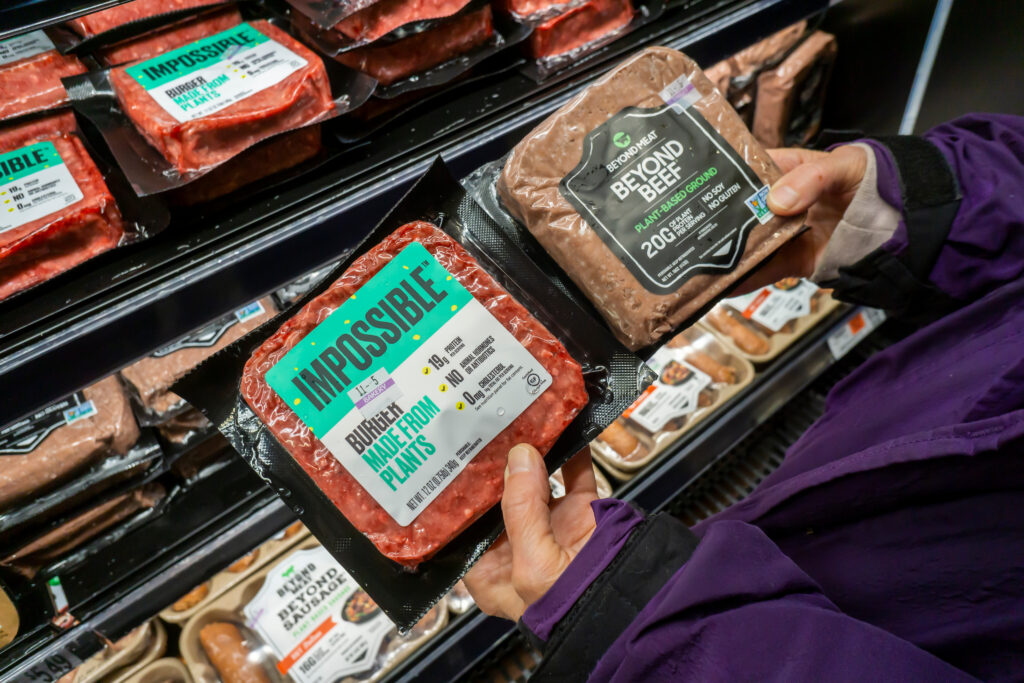No matter how you look at it, 2022 was a dismal year for fake meat. The over-saturated plant-based meat alternative sector finally hit its breaking point, leaving many – including industry CEOs – admitting, “There’s no way the space supports 20 manufacturers making burger patties.”
Synthetic meat was supposed to be the next big thing. Some even predicted it would replace real meat altogether. But after initial consumer curiosity subsided, 2022 proved fake meat might be nothing more than a niche product for vegans who miss the real thing.
Here are 10 reasons why 2022 was the worst year yet for fake meat.
1. Kellogg’s Sun Set on MorningStar
MorningStar is one of the largest plant-based meat options on the market, in large part because its parent company is Kellogg. Kellogg helped MorningStar launch into nearly every grocery store in the country. But Kellogg also has shareholders to please. And MorningStar’s sales were dragging the company down. Kellogg announced in June that it would be spinning out the MorningStar brand, citing “tough” conditions for faux meat.
2. Outbreak
One of the talking points often touted by anti-meat activists is that underprepared meat poses a health risk and that plant-based meat is safe. But one major outbreak showed imitation meat can have real outbreaks, too. In June, nearly 500 people suffered “severe digestive issues” after consuming plant-based “crumbles” in a taco meal kit from Daily Harvest. At least one customer was hospitalized. While most Americans are aware of the harms of consuming underprepared meat, synthetic meat consumers are often preparing the product for the first time.
3. Not Passing the Protein Test
Multiple studies released in 2022 revealed that plant-based protein carries less nutritional value than animal protein. One study published in the Journal of Agricultural and Food Chemistry revealed that the human body struggles to absorb as many protein peptides in plant-based chicken alternatives when compared to the real thing. The study found that 14 percent of the plant-based peptides were absorbed compared to 50 percent of the chicken peptides. A second study compared the Beyond Burger to real meat and similarly found that body received fewer amino acids from the faux meat.
4. Lawsuits
This year left the synthetic meat industry facing several legal battles. Some of the lawsuits are from outside the industry, including one questioning the accuracy of the protein content listed on the packaging. Other lawsuits are inside the industry, including one lawsuit between Motif and Impossible over alleged patent infringement. With sales struggling, these lawsuits add another expense these companies likely wish they could have avoided.
5. Nutritionists Are a ‘No’ on Fake Meat
A new poll by the Center for Consumer Freedom revealed that 73 percent of nutritionists do not recommend fake meat. The poll, released in September, also revealed that 40% of nutritionists found that real meat in moderation is a better choice than plant-based alternatives while 33% recommended eating more vegetables instead of buying highly processed plant-based meats.
6. Shoppers Thought One Bite Was Enough
Another devastating poll for fake meat revealed that many faux meat customers were not repeat buyers. The consumer study, published in Scientific Reports, found that 40 percent of Americans who purchased a plant-based meat product once never bought it again. That is on top of the 80 percent of shoppers who never purchased any synthetic meat products.
7. The McPlant Wilts
Breaking into the fast food sector has been a top goal of the imitation meat industry. And Mcdonald’s is the crown jewel. The McPlant – a plant-based burger made in partnership with Beyond Meat – was supposed to be a huge victory over beef. But customers weren’t buying it – literally. Sales were so dismal Mcdonald’s pulled the McPlant from its test markets in August with no reported plans to bring it back.
8. Beyond Mold
One of the most stomach-churning fake meat stories of the year broke just before Thanksgiving when former employees of the Beyond Meat factory near Philadelphia revealed images of the factory allegedly crawling in black mold. The employees also told Bloomberg that products in the factory tested positive for listeria twice while they worked in the facility. Beyond Meat maintains that it passed all its recent safety inspections.
“Mold growth takes a while — that underscores a lack of cleanliness,” said Bill Marler, a food-safety attorney, after viewing some of the photos.
“If neat and tidy is 1 and filthy is 10, I’d put this at an 8” https://t.co/bdWjgpJz27 pic.twitter.com/Yy9YXzcB1p
— Bloomberg (@business) November 21, 2022
9. Beyond Stocks Tumble
As the only publicly traded fake meat company, Beyond’s stock is one of the few clear bellwethers for the strength of the industry – and it doesn’t look good. As of late 2022, Beyond’s stock is down 79 percent on the year to $13.32 and is just a fraction of its all-time high in 2019 of $234.90.
10. Layoffs
Unfortunately for the industry’s employees, the poor performance of the plant-based sector has led to major layoffs at several faux meat companies. Beyond Meat laid off 19 percent of its staff. Impossible Foods laid off 6 percent of its staff, as well. As the industry continues to shrink and consolidate, more layoffs will likely follow.





